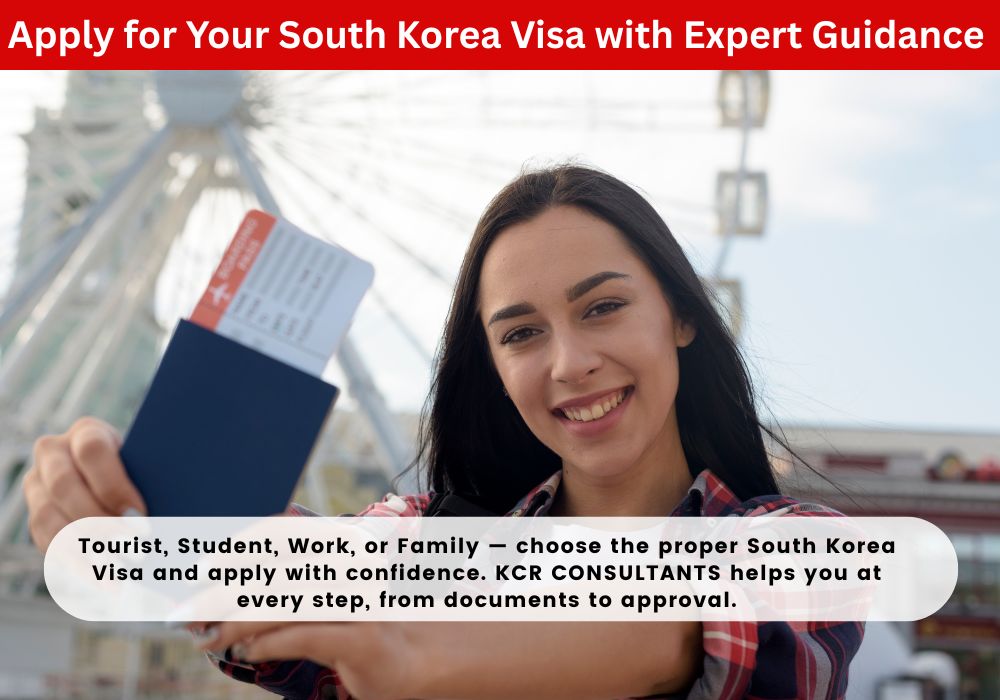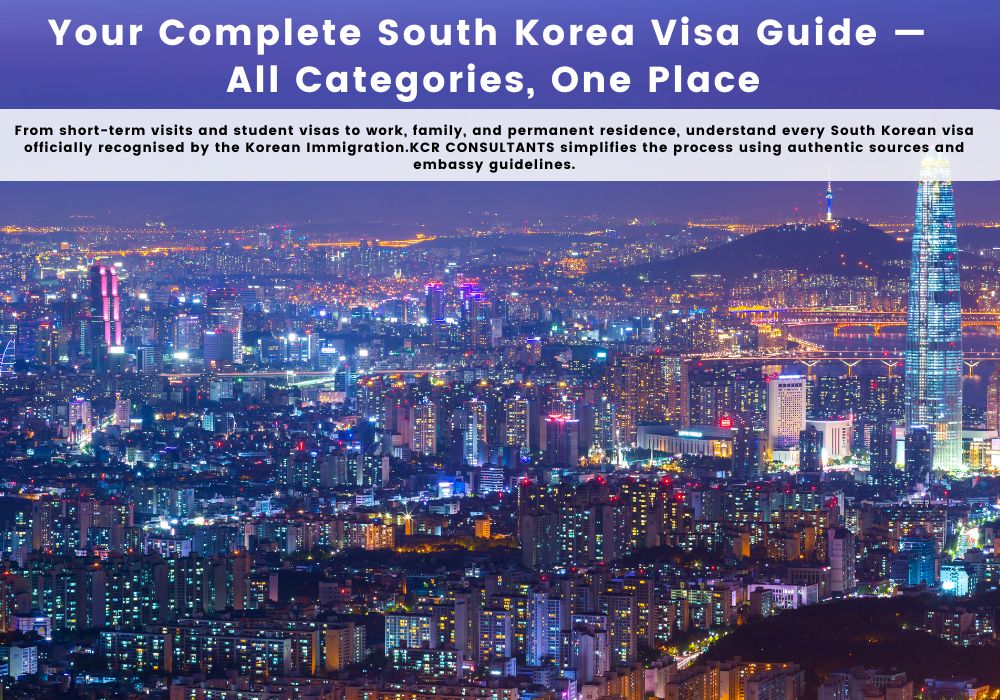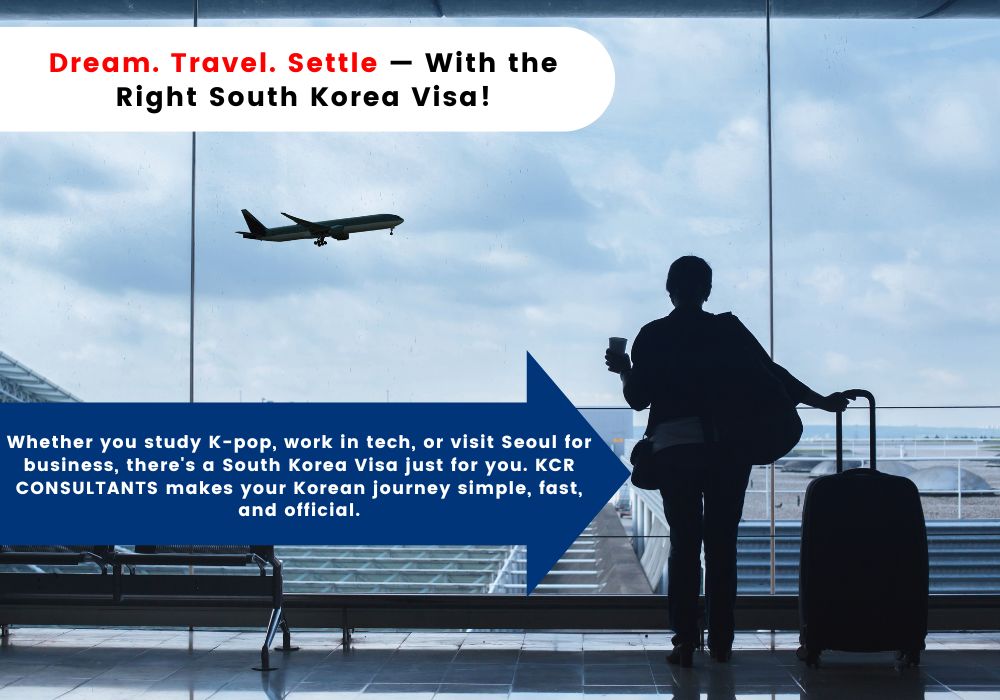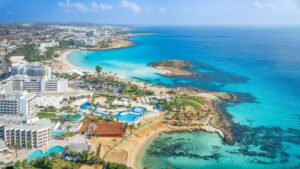What is a South Korea Visa?
A South Korea visa is official permission to enter and stay in the Republic of Korea for a specific purpose and period. Korea uses various visa codes based on the 'purpose of entry and stay in Korea,' including B-visa, C-visa, D-visa, E-visa, F-visa, G-visa, and H-visa. Each code is linked to activities such as tourism, study, work, business, family life, or long-term residence.
The Korean government manages visas through the Korea Visa Portal (visa.go.kr) and the Korea Immigration Service. These official sites categorise visas into the following categories: short-term visits, study and training, employment, family and residence, and special categories.
For Indian and other international applicants, understanding the prominent South Korean visa categories is the first step in planning a smooth journey for tourism, study, employment, or settlement.
Visa-Free Entry, K-ETA and When You Still Need a South Korea Visa
Some nationals can visit South Korea without a traditional visa for short stays. Many of these travellers now require a Korea Electronic Travel Authorisation (K-ETA) instead of a sticker visa when visiting for tourism, business meetings, short-term study, or family visits.
K-ETA is an online authorisation that must be approved before boarding your flight. It is primarily for travellers from visa-exempt countries who plan a short visit, typically lasting up to 90 days. Suppose your nationality is not K-ETA eligible or your purpose extends beyond tourism or short study. In that case, you must apply for the appropriate South Korean visa at a Korean embassy or consulate.
Even if you hold a K-ETA, you still need a full Korean visa for long-term work, degree studies, or immigration-related purposes. Therefore, it is essential to check your status carefully before travelling.

Short-Term South Korea Visa Options (Tourism, Transit and Business)
Short-term visitors typically fall under the B-type and C-type visa categories. These are classic short-term visas designated for travellers who wish to visit the country for tourism or business purposes.
On the Korea Visa Portal, short-term categories include:
- B-1 Visa Exempted – For specific diplomatic or treaty-based exemptions.
- B-2 Tourist/Transit – For general or Jeju-only transit and tourism.
- C-3 Short-Term Visit visas – For ordinary tourists, group tourists, business visitors and some overseas Koreans.
- C-3-10 Direct Transit – For air-side transit through Korean airports.
These short-term South Korean visas are usually valid for stays up to 90 days. Exact stay periods and allowed activities depend on the code printed on your visa and the immigration officer's decision. Always match your actual purpose with the correct visa category for South Korea.
Student and Training South Korea Visa Types (D-Visas)
If you plan to study in South Korea, you typically need a D-series visa. These visas cover degree studies, language training and other forms of structured training.
Key examples include:
- D-2 Student Visa – For full-time degree programmes such as bachelor's, master's or PhD at Korean universities.
- D-4 General Trainee Visa – – For language courses and specific non-degree training programmes.
Official guidelines stipulate that applicants must submit a completed visa application form, along with all other required supporting documents, to the South Korean consulate or Embassy. Required papers depend on the exact type of South Korean visa. They may include admission letters, financial proof, and academic records.
A correctly issued Korean student visa allows you to stay in Korea for your course and register for an alien registration card after arrival. Short-term B-type or C-type visas are typically not valid for full-degree studies at universities.
Work and Professional South Korea Visa Categories (E and Related D Visas)
Those who intend to work in South Korea are required to obtain an employment-linked visa. Korea divides professional and non-professional work into several E-type and some D-type categories.
Important examples include:
- E-1 Professor and E-3 Research– For teaching and research at higher-education or research institutions.
- E-2 Foreign Language Instructor – For teaching conversation in approved schools and institutes.
- E-4 Technology Instructor/Technician and E-5 Professional – For certain licensed professions and technical roles.
- E-7 Foreign National of Special Ability (Designated Activities) – For specialist positions in fields designated by the Korean government.
- D-8 Corporate Investment and D-9 International Trade – For investors and business managers working in Korea.
Each work-related Korean visa has specific qualifications, salary requirements, sponsor requirements, and documentation rules. Employers typically act as sponsors and must comply with immigration and labour regulations when inviting foreign staff to work in their country. The Korea Visa Portal and immigration offices provide the latest information on the conditions for each South Korean work visa.

Family, Marriage and Long-Term Residence South Korea Visas (F Visas)
For family life and long-term residence, South Korea uses F-type visas. These allow more flexible activities than many E-type or D-type visas and may lead to permanent residence.
Main examples include:
- F-1 Visiting/Joining Family– For family members joining a foreigner or a Korean resident.
- F-2 Resident Visa – For particular long-term residents, professionals and, in some cases, investors or highly skilled workers.
- F-3 Dependent Family – For spouses and children of many D- or E-visa holders.
- F-4 Overseas Korean – For eligible ethnic Koreans holding foreign nationality.
- F-5 Permanent Resident – For long-term residents who meet strict criteria.
- F-6 Marriage Migrant Visa – – For foreign spouses of Korean nationals.
The F-6 South Korean visa has its own specific requirements for marriage proof, income, accommodation, and basic Korean language proficiency, supported by settlement support programmes run by the Immigration Service. These F-type South Korea visas are crucial for those planning to live with family or settle long-term in Korea.
Working Holiday and Other Special South Korea Visa Routes (H and G Visas)
Korea also offers notable visa routes for youth mobility, temporary work, and humanitarian situations in South Korea.
The most common is the H-1 Working Holiday Visa. This Korean visa enables young adults from partner countries to stay in Korea for approximately one year, travel, and take short-term jobs to support their stay.
Another category, the H-2 Working Visit, is primarily for certain overseas Koreans and has its own specific rules regarding age and eligibility. G-type South Korean visas cover humanitarian protection, medical treatment, and some exceptional cases, such as asylum seekers.
These special Korean visas are more niche but essential for specific groups, such as young travellers, overseas Koreans, or individuals requiring protection.
How to Apply for a South Korea Visa
The process for obtaining a South Korean visa is clearly explained on the official portals. In most cases, applicants should:
-
1. Identify the correct Korean visa type.
2. Use the Korea Visa Portal – either the "Visa by Categories" or "Visa Navigator" tools- to match your purpose with the correct South Korean visa code
3. Prepare documents
4. Standard items include a valid passport, a completed visa application form, a recent photograph, a processing fee, and supporting documents such as admission letters, employment contracts, business registration certificates, or family certificates. Requirements vary by Korean visa category.
5. Submit to the right place.
6.Most people apply at a Korean embassy or consulate in their country. In some cases, sponsors in Korea first obtain a visa issuance number through a local immigration office. Then the applicant receives the South Korea visa at the Embassy.
7. Use e-Visa where available.
8.For specific categories, Korea offers an e-Visa system through its online portal, particularly for group tours or sponsored applicants.
Processing times and fees vary by nationality, visa type, and mission, so it is essential to check the website of the specific Korean Embassy or consulate before filing any South Korea visa application.
Choosing the Right South Korea Visa with KCR CONSULTANTS
With numerous South Korean visa categories and frequent policy updates, it is easy to feel confused. Tourism, study, employment, family reunion and long-term residence all rely on different Korean visa codes, documents and procedures.
KCR CONSULTANTS can help you:
- Match your goals with the correct visa type for South Korea.
- Understand student (D-2 / D-4), work (E-series, D-8, D-9), and family (F-series) options.
- Plan a long-term pathway that may transition from a student or work visa to resident status, and later to permanent status.
- Prepare document checklists based strictly on official South Korean sources and embassy guidelines.
Suppose you are planning to travel, study, work, or settle in Korea. In that case, you can reach out to KCR CONSULTANTS for personalised guidance on South Korean visas.

Important Disclaimer
South Korea regularly updates its visa rules, eligible countries, K-ETA coverage and documentation requirements. The Korea Visa Portal, the Korea Immigration Service, and official embassy websites are the final authorities for all South Korean visas.
Before you apply, always:
- Re-check the latest visa information on visa.go.kr and immigration.go.kr.
- Confirm details on the website of the Korean Embassy or consulate responsible for your country.
- Verify any special rules for Indian citizens or other specific nationalities.
KCR CONSULTANTS will base its counselling on these official and authentic sources. Still, final decisions on South Korean visas rest solely with the Korean immigration authorities.





